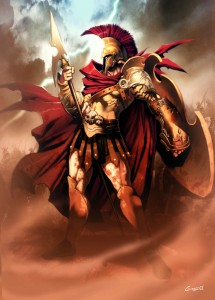 Ares (Mars) Greek God - Art Picture by GenzoMan
Ares (Mars) Greek God - Art Picture by GenzoManAres (Roman equivalent is Mars) was the Greek god of war. He is one of the Twelve Olympians, and the son of Zeus and Hera. In Greek literature, he often represents the physical or violent and untamed aspect of war, in contrast to the armored Athena, whose functions as a goddess of intelligence include military strategy and generalship. Since ancient times the people, in order to solve their differences resorted to the most painful act for humans, war.
The ancient Greek mythology is dominated by two major combat operations: the ten-year Trojan War and the Argonaut’s campaign. So the Greeks coined a god, Ares, who personified this terrible scourge. He was always thirsty for blood and his main feature was the irrational rage and the lack of any courtesy.
Ares belongs to the second generation of Olympians. He was lawful son of Zeus and Hera. His love to cause wars and quarrels made him obnoxious not only to other gods but also to his father Zeus, who never missed an opportunity to attack him and call him a "stubborn head".
The biggest controversy was between Ares with Athena, who was also a war goddess. But Athena was, in parallel, the goddess of wisdom, so she was combining power with intelligence. That's why most of the times she prevailed against bellicose Ares and was bringing him to shame. The most significant conflicts between them were made during the Trojan War.
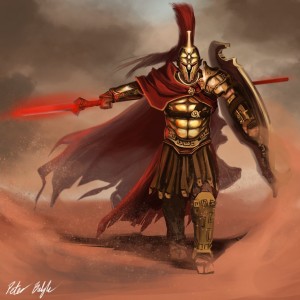 Ares (Mars) Greek God - Art Picture by Peterprime
Ares (Mars) Greek God - Art Picture by Peterprime
As we are informed by Homer, the brawler God had promised to his mother Hera and Athena to help the Greeks. But, seduced by the beauty of Aphrodite, he passed at a critical moment in the opposing faction. For some time, he stood by at the main hero of the Trojans, Hector, who decimated the Achaean warriors, since Achilles was missing from the battlefield. Hera was indignant with her son who, since childhood, only caused problems, ran to Zeus and asked permission to evict Ares from the battle, injuring him. He accepted, since he was not at all fond of his son. Immediately Hera sent Athena to arrange the matter as she knew.
The wise goddess wore the Kynee, the cap of her uncle Hades, which made her invisible, and jumped at once from Olympus in the Trojan plain. Then she stood on the chariot of Diomedes that started battle with Ares, without knowing of course that he was against an Olympian god. Ares first threw his bronze spear against mortal warrior, but the unseen Athena repelled it with both her hands and it fell on the ground.
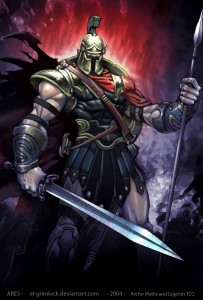 Ares (Mars) Greek God - Art Picture by el grimlock
Ares (Mars) Greek God - Art Picture by el grimlock
Then Diomedes threw his spear and Athena directed it in the side of Ares. He fell wounded on the ground and screamed with a terrible voice that panicked Greeks and Trojans, for he was like ten thousand warriors shouting together. Then he flew to Mount Olympus shrouded in thick clouds and immediately went to the palace of Zeus.
He showed him his wound and while weeping, he started complaining:
“Father Zeus, you see the injustices take place, but you are not mad. All gods always do your will and obey your orders. But you can not see Athena who always makes her own. You never argue with her since you gave birth to her by yourself. And now, she puts a mortal to hit me with his spear and ridicule me!”
The father of gods and men, furious with his son, responded with insulting words.
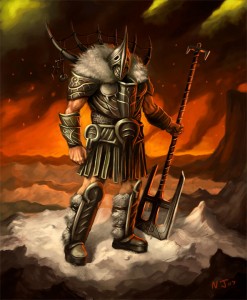 Ares (Mars) Greek God - Art Picture by TaekwondoNJ
Ares (Mars) Greek God - Art Picture by TaekwondoNJ
“Are you not ashamed to come before me whining? Know that I hate you, because you always like wars, fights and quarrels. You are a stubborn head exactly like your mother Hera. Know that if your father was any other, he would have thrown you in Tartarus, even more below than the Titans.”
Although Zeus used insulting words, Ares was his son was and he could not bear to see him hurt and crying. So Zeus instructed Paionian, doctor of the gods to heal his wound. But in the final battle of the Trojan War all the gods, with the permission of Zeus, ran fully armored in the battlefield. In the Greek camp joined Hera, Athena, Poseidon and the divine blacksmith Hephaestus. Beside the Trojans arrived dreadful Ares, master archer Artemis, long-haired Phoebus, Leto, the smiling Aphrodite and the river Xanthus.
Ares, who was embittered with Athena, because she always embarrassed him in front of the Olympians, charged with the first opportunity towards her and started talking with bad words:
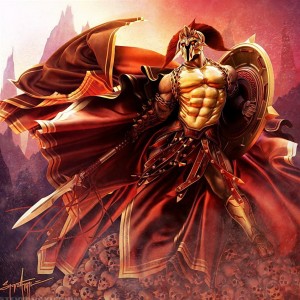 Ares (Mars) Greek God - Art Picture by SteveArgyle
Ares (Mars) Greek God - Art Picture by SteveArgyle
“Shameless bitch, with your ego and insolence you have caused a lot of trouble to the gods!”
Then he threw his spear at aegis of Athena that even the thunder of Zeus could not pierce. The goddess shook and took two or three steps backwards. Without losing her courage, grabbed a huge rock that people had set up for border and hurled it the bellicose god. The rock struck Ares on the neck, forcing him to bend on his knees and fall down. His huge body spread seven square kilometers as he fell on the ground. His knees bled and his hair was filled with soils. All the gods started to laugh when they saw the god of war lying on the ground, who once again was ridiculed by Athena. Only Aphrodite ran to him, helped him get up and grabbing him by the hand raised him to Olympus.
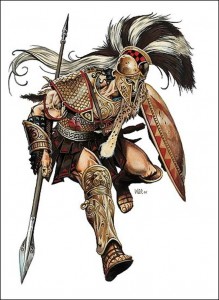 Ares (Mars) Greek God in attack stance - Art Picture
Ares (Mars) Greek God in attack stance - Art Picture
Ares also had several differences with the famous hero Heracles (Hercules), who was enjoying the protection of Athena. Once, the Swan, son of warlike god and Pelopeias, wanted to build a temple from the skulls of men, in honor of his father. Therefore he was killing every passerby. So he tried to do the same thing with Heracles. Ares rushed alongside his son and forced the hero to withdraw. But then Heracles returned and killed the Swan.
For this event there are several variations. So, one myth tells that Swan agreed with Ares to kill Heracles. During the conflict the hero killed the Swan and the wounded immortal god in the thigh. Another poet tells that the Swan was the son of Ares and Pyrinis and challenged Heracles to a duel. The god wanted to help his son and tried to burn the opponent. But Zeus, who was the father of the hero, threw a thunder between them and separated them. Another son of Ares that had differences with Heracles was Diomedes of Thrace.
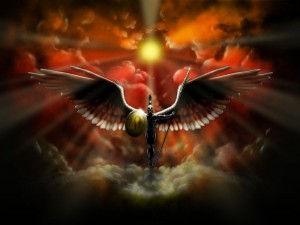 Ares (Mars) Greek God in the sky - Art Picture
Ares (Mars) Greek God in the sky - Art Picture
This country was barbaric and Ares had many relationships with her. It is said that there was his second palace and lived there for a long period of time. This son had mares that were feeding with human flesh. Heracles grabbed them the led them to the sea. Diomedes persecuted the hero, but eventually was killed by his arrows.
Still, they say, that Ares had brought up the Stymphalian Birds, predatory vultures fed with human flesh. These birds were killed by Heracles, while performing one of the twelve labors that Eurystheus had assigned to him. This feat took place with the help of Athena, who gave him the cymbals of Hephaestus.
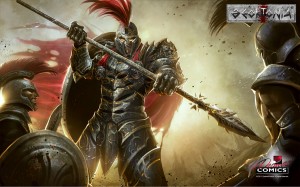 Ares (Mars) Greek God - Art Picture by deimoscomics
Ares (Mars) Greek God - Art Picture by deimoscomics
But Ares, in the war with the Giants, where he ought to have a leading role, did not perform particularly well, as opposed to Athena and Heracles, who even then was still mortal. From what Hesiod tells us he killed only one Giant, named Milantas.
Nevertheless, from the generation of the Giants, Ares had experienced another terrible humiliation. The Aloades Giants, Otos and Ephialtes, took him prisoner. This happened either when the Giants were attempting to climb up Mount Olympus, placing one mountain on top of another, either during the execution of the task entrusted to them by Aphrodite, namely to guard Adonis.
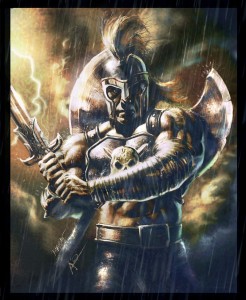 Ares (Mars) Greek God - Art Picture by rudyao
Ares (Mars) Greek God - Art Picture by rudyao
For one reason or another, the Aloades kept their prisoner into a large copper bottle for thirteen months. And he would stay even longer if the secret had not escaped from Erivoias’s mouth, stepmother of Giants.
When Hermes heard about it, he ran to release him. Ares did not dare to appear in front of the immortals, he knew that he would have to deal with the reprimand of his father, but also with the laughs and jokes of the other gods and especially Athena’s. So he ran and hid in the rocks of Naxos.
Ares once mated with Agrafi, the daughter of Cecrops, and acquired Alkippi. But Alirrothios, son of Poseidon and the Nymph Evritis, was dazzled by her beauty. As the daughter resisted his erotic call, Alirrothios raped her. Ares, in order to avenge the dishonor of his daughter, killed him. Neptune called an emergency court of gods to judge him guilty of murder. The court session was on a hill near the Acropolis. There the gods decided the acquittal of Ares.
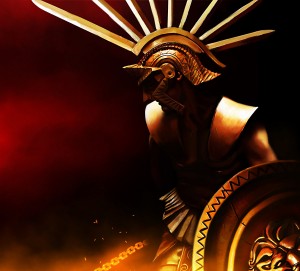 Ares (Mars) Greek God - Art Picture by konnee
Ares (Mars) Greek God - Art Picture by konnee
The hill was named Areopagus (Rock of Ares) and since then it was decided that all criminal cases would be judged there.
Others say that the Amazons, the famous warriors, were the daughters of Ares. Once they occupied Athens in the years that Theseus was King, they offered sacrifice to their father on the hill, who since then was named Ares.
Ares held an important role in the myth of Cadmus, the founder of Thebes. More specifically, Cadmus killed a dragon that was the son of the Olympian god and the Nymph Telphousa. For this reason, the hero was forced to serve Ares as slave for a year. By order of the god, Cadmus sowed half the dragon's teeth in a plowed field and the earth grew fierce warriors named Spartoi. With a clever plan of Cadmus, they killed each other and only five survived, who were the first citizens of Thebes.
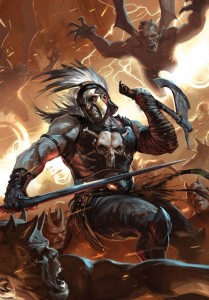 Ares (Mars) Greek God fighting monsters - Art Picture
Ares (Mars) Greek God fighting monsters - Art Picture
Later, Ares was reconciled with Cadmus and gave him Harmony as his wife, Are’s daughter by Aphrodite. All Olympian gods attended the marriage of the goddess with the mortal hero. Apollo and the Muses sang beautiful hymns and Hephaestus gave the bride a beautiful silk veil and a golden necklace.
The most famous love affair of Ares is his illicit affair with Aphrodite. She was the lawful wife of Hephaestus. When Aphrodite saw the body workout of Ares and his beautiful face, she was unable to resist the call of love. This infidelity was perceived by Helios, who revealed the details of this incident to the divine blacksmith Hephaestus. In order to catch them in the act, he put in his bed magically nets and pretended he was leaving for a trip to Lemnos.
The god of war, moments after he saw him leaving, ran to his palace and met Aphrodite. The two lovers, when they lied down in bed, were caught in the magic nets. Soon, Hephaestus appeared and alerted all the gods. They began to laugh when they saw the trapped lovers. Once Hephaestus freed them after the intervention of Neptune, Aphrodite took refuge in the temple of Paphos and Ares in Thrace.
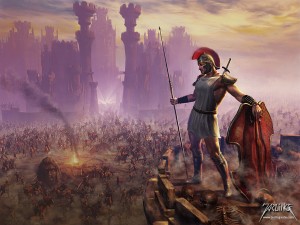 Ares (Mars) Greek God - Art Picture by jarling art
Ares (Mars) Greek God - Art Picture by jarling art
Except his daughter Harmony, Ares had two sons, Deimos (Terror) and Phobos (Fear), from his relationship with Aphrodite. They were inseparable companions and servants of Ares. They followed him in all the battlefields and the ancient Greeks worshiped them along with the god of war. They offered sacrifices before the start of the battle, to chase away the fear from their line up and scatter it to their opponents.
Additionally, Ares copulated with the Bride Arpina and acquired Oinomaos. Oinomaos had a very beautiful daughter, Hippodamia. He did not want her to get married because he was also in love with her.
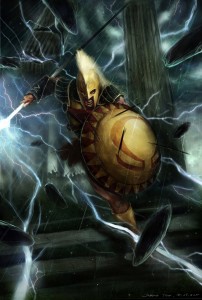 Ares (Mars) Greek God - Art Picture by rhinoting
Ares (Mars) Greek God - Art Picture by rhinoting
For this reason, he was inviting the aspiring grooms to a chariot race. He had two horses in his chariot, gift of his father, who ran faster than the wind. So he was winning every time and then was killing the prospective grooms.
Only Pelops managed to beat him, with the advice of Hippodamia, which she fell in love with him.
Also, Meleager was the son of Ares from Althea, wife of Eneas. She managed to save her son at the last moment, hiding the torch of his fate in a box. But when Meleager, in order to defend his beloved Atalanta, killed Althea’s brothers, she threw the torch into the fire and her son died instantly.
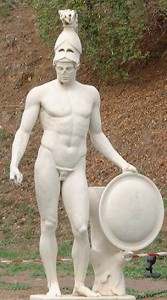 Greek God Ares (Mars) holding his shield Statue
Greek God Ares (Mars) holding his shield StatueMoreover, another son of Ares was Aeropis, who with the intervention of the god managed to nurse from his dead mother.
Additionally, Filonomi was seduced by the warlord god and gave birth to Lykasto, who later became king of Arcadia. In addition, with Chrysi (Golden) he acquired Ixion and Koroni.
Finally, in Libya, another of his sons named also Lykastos, used to sacrifice to his father all the foreigners that were arriving in his country.
The ancient Greeks may not have liked the warlike god, so we do not often see magnificent temples and shrines, as we do with the other Olympians of the Pantheon.
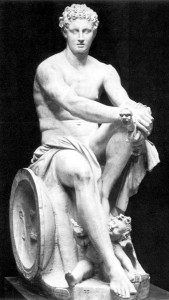 Greek God Ares (Mars) Statue
Greek God Ares (Mars) Statue
His worship was widespread mainly in the Peloponnese, Argos, Mantinea and Sparta. It was thought that Ares was present in all the battle fields, sometimes on foot, sometimes on his chariot, drawn by four horses, children of Erinya (Fury) and Voras (North).
Besides Deimos and Phobos, the terrible Eris, who personified the discord, and Keres, who crossed the battlefields and was scattering destruction were also attended as his escorts.
The main symbols of Ares were the spear and torch. From the animal kingdom, his symbols were the vultures that ate the corpses of slain warriors and dogs which were sacrificed in Sparta along with bulls and cocks.
Please leave a comment if you liked this article 🙂
All pictures are also uploaded in Albums on the Greek Mythology Pantheon page on Facebook, visit us at :


22 COMMENTS
Dude this was like reading about myself im basically Ares
no you aren’t
no tf u arent
Areswar007, I believe you. I have always felt like I am Hades, ever since that one day…
yall are crazy hah
no that’s crazy guys
yep i agree
Looks like he Ares wasn’t liked so much by da gods.
Well iam just like ares
I’m Apollo and leave it at that.
When was this article published? I need to cite it in my works cited.
It was published on 28 May 2013.
Helped a lot thanks
ur wlcm
Lefteris:
The 2017 issue of Smithsonian Magazine on the cover has the image of what they call “The Golden Warrior” they found in a 3500-year old tomb in an Olive grove adjacent to a Palace of Nestor outside of the acropolis of Pylos. The article starts on page 38.
The Warrior would have held a very high status based on what the found along with the remains in the Tomb. The article can be read at the following link:
http://www.smithsonianmag.com/history/golden-warrior-greek-tomb-exposes-roots-western-civilization-180961441/
The gold mask used in the tomb, the image of the warrior almost gives the appearance of Adonis.
My question to you is: Who do you think this individual was based on what was found with him and his appearance captured by the mask?
To view the cover page that has a good image of the Golden Mask found of this individual – http://thumbs.media.smithsonianmag.com//filer/8a/0a/8a0a4261-01e7-4e9d-9395-c5bad019021d/janfeb17_covmini.jpg__192x256_q85.jpg
this was good i am using it for my essay
wiil join god greek all for good
Helped a lot thanks, and do think that Ares was Arrogant or just incapable of seeing the obvious
super entrsting
interesting
Ancient Greek mythology tells a story about a man named Mikael Shadows born from two mortal parents during the century 23 B.C. He was one of seven people to be sacrificed for Ares, god of war. But instead became the first demigod after a human birth by an unknown deity. In exchange for this godly gift, there had to be a sacrifice made and that was his entire family. Mikael is the son of Melite (mother) and Codros (father), he is also the brother of Icarus (brother), Patron (brother) and Isadora (sister). It is said that Mikael will roam free on this earth until he seeks his true vengeance on Ares. Mikael Shadows, God of vengeance.